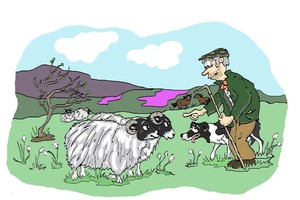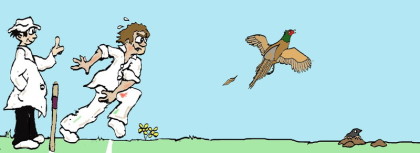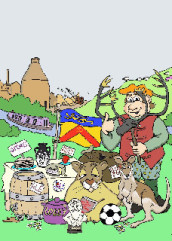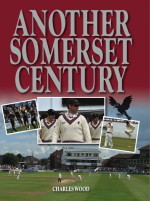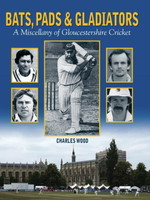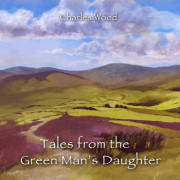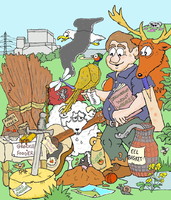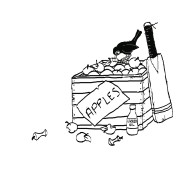
A Few Tasters
Excerpt from Bats, Pads and Gladiators
When the spring sun shines, mention ‘Hunts’ in Gloucester and it’s likely neither the Beaufort nor the Vale of the White Horse is on your mind. Instead, you’re probably cogitating about cricket bats.
The old Moreland Match Factory may have closed in 1976, but to say anything made there today amidst the lathes, mallets, grinders, chisels and sawdust is no better than ‘matchwood’ would be downright insulting. Yet, not wishing to sound finickity, to the naïve a cricket bat is just that.
Martin Berrill promises to put such ideas well and truly straight by making some of the finest examples of bat in the country. To his mind there’s willow and there’s … well, willow. Although, when I caught up with him at an inopportune moment he must have wished he were less of a bat maker and more of an octopus.
He was trawling through the inboxes of two computers trying to find an email whilst having to tackle three simultaneous phone conversations. One sounded like blue murder. ‘Stick it in the chest!’ he ordered. And his words into another mouthpiece were anything other than reassuring. ‘No, not you, Tracy. I’ll get back to you as soon as I’m free. Probably in six months.’ And into the third, ‘I can’t see any evidence. When did you say you sent it? …. Can I get back to you? I’ve a shop full of people baying for me.’
The last point I quite understood. It was a Friday morning and, with the weather set fair, Martin had customers to satisfy. In this he’s often likened to Mr Ollivander, the Diagon Alley wand maker in Harry Potter. Bat choosing is a process of elimination. Martin remembers every bat he’s ever sold. Every single one. Trial bats in the shop often pile up like Jenga as the perfect match between bat and bod is sought.
‘All my bats are guaranteed to make a century,’ he told me before chuckling, ‘ I can’t guarantee the individual holding it.’ Never was a truer word spoken in jest.
With one of Martin’s bats in their hands, Courtney Walsh and New Zealand’s Danny Morrison vied with other for the most number of international ducks. It’s something that still makes Martin wince.
Happily he’s proud to say Charlotte Edwards, the captain of England Women’s cricket, is currently one of his more adept clients. Other names tripped off his tongue as if reciting an academy of fame – Rod Marsh, Imran Khan and David Gower. After uttering ‘Monty Panesar’ Martin gave a sudden nervous cough. This I learned was nothing to do with Monty’s batting prowess. Rather it was a demand to Martin to pay him £30,000 for the privilege of using a Hunts bat. I remarked I’d check on Monty’s current blade at the earliest opportunity.
As for himself, Martin, now in his early 50s had retired his own cricket gear into a squinch for spiders somewhere at the back of his garage. However, it doesn’t seem too long ago since he was playing in the Stroud League for King’s Stanley whose Marling Close ground was once fraternized by film stars. Here Roy Bassett stumped both Kenneth Moore and Basil Rathbone. And here Martin scored centuries with a bat that he’d lovingly crafted himself after moving to Gloucester in 1986. By then he had nine years of bat making experience behind him.
His first year in the trade had been marvelous. He’d delighted in both Geoffrey Boycott and John Edrich scoring their respective hundredth hundred wielding the Hunts bats he’d made while working in St Neots beside the Great Ouse river in Cambridgeshire. They were idyllic days.
Drawn into nostalgia Martin claims that back then he grew his own willow tree, made a bat from it, and used it to score a century. Until the custom died with the ‘70s, Hunts willows were actually grown on an island in the middle of the Great Ouse and, when chopped, the logs had to be floated downriver to the point of collection.
‘Didn’t that make the bats a bit damp,’ I asked, thinking of the corkscrew hazel in a dark dank corner of my garden and ahead of Martin explaining that Hunts religiously dried their timber in stacks slowly over a period of time, swopping top for bottom three or four times a year. It was this process that taught him to grade a chunk of willow.
Also, one can accurately say he can ‘read’ a cricket bat. The difference between English and Kashmir willow disgusts him. The latter wood is whiter and the grain prouder, and not in a good sense. For to make a blade smooth requires the job of grinding, not gentle sanding. Those wanting to know about performance, it’s the difference between ‘ping’ and ‘clunk’.
My confiding to having bought a Hero Honda for a quid off the internet only to feed the bloody thing to an autumn bonfire after a single innings of two balls ended by middling a gentle full toss limply to mid-on rather proved Martin’s point.
And he bemoans the influx of other cheap subcontinent cricket merchandise, too. Under his desk is a box of about thirty half balls that he’s sawn in two. ‘The rubbish they put inside has to be seen to be believed,’ he said getting his gander up. ‘There’s scrunched up silver paper and everything. The balls don’t just go out of shape, they go biscuit flat.’
To Martin, the makeup of a cricket ball touches a nerve in him. Between 1981 and 1985 he was hand stitching them in Australia. Four years of bruised and needle impaled fingers was enough for him, agreeing with me that it was ‘convict work’. Much better sticking to making bats.
And in our changing times he has achieved this with aplomb in Gloucester. Despite being forced to source his English willow from the Essex wholesalers AS Wright he reckons he’s one in a small minority of only ten or fifteen master craftsman bat makers remaining in England. He can’t get apprentices to carry on tradition for love nor money. Young people want to work with computers instead of with their hands, he maintains. So long may Martin continue to be the stoic.
With his staff becoming increasingly agitated I left this octopus man of declining breed to his admiring customers and his Jenga, hoping at the same time he’d avoid committing blue murder. Mr Ollivander, indeed.
Now, what if he could just grow himself a Whomping Willow, I thought. That would make cricketing weekends around Gloucester and beyond sublime.
Excerpt from Exmoor Amour
ISBN 9780857040480
I chatted with Chaggi, a twenty-something cook from Rajasthan who liked to dance spontaneous Bollywood dervishly, whirling a tea towel. He had identified that I was from ‘Great England’ shortly after my arrival amid the annual migration of dragonfly millions when I let slip more than one or two ‘oh, m’dears’ as wing vibrations tickled my face.
Chaggi and I had quickly glossed past influence of my countrymen in these local parts and in the sub-continent generally.
“The English had been a bit naughty,” I ventured.
“We were deluded,” countered Chaggi.
Well, so was I. ‘Relax! Revive!! Rejuvenate!!!’ the webpage had said of Chaggi’s workplace.
For his masala tea Chaggi had been milking a black and white cow like one of those so common in rural Blighty, only this one understood Hindi. And both he and I were taking a time-out. Mine was from a hard-core ayurvedic weight loss experience of yoga and scalding hot, medicinal herb-bag pummellings; ghee gulping and purgation; not to mention vegetarianism. Although I politely avoided Chaggi’s curried beetroot, apparently good for constipation and haemorrhoids, cabbage, coming with coconut and thin rice soup, was fed to me daily. Too much cheddar, butter wedges on crusty white farmhouse bread and crispy Dunster free-range chicken skin had created me a girth in need of desperate measures.
A sparrow chirped forlornly looking every inch a dead-ringer for the many that daily visited the bird table in the narrow Wiveliscombe lane called ‘Skoda Row’, nicknamed such because of the number of four-wheeled Czech mates now owned by several householders and their neighbours who argued over parking space until the bim-boms and caterwauls called time. This was home - a small town that for ease of spelling became known simply as ‘Wivey’.
Perhaps the Indian sparrow had become lonely. Out there in the murk I knew the local meat-eaters were nibbling. But for once I wasn’t jealous. Sparrows in India are viewed as aphrodisiacs due to their public exhibitions of libido and as a consequence are becoming a somewhat rare treat. Yet, in a moment of herb-induced clarity, I comprehended why Bilbo, my patio-tree sentinel, aged, stripy cat, behaved like a tart.
And there were other tweaks of home. Twelve hours earlier, somewhere up north, Hyderabad I think, Somerset’s cricketers had sung lustily about a blackbird in a wurzel tree and a great big stick to knock him down. It was the happiest moment of their captain Justin Langer’s illustrious career. The team had beaten Deccan Chargers in a 20/20 game of bish-bash-bosh, earning the players enough to continue sipping their Starbucks coffee on their return to Taunton. I said as much to Chaggi.
“Marcus Trescothick,” said Chaggi, “We love him here. But he should drink our black tea, it would help his stress.’ Then with the ayurvedic wisdom added, ‘Mr. Trescothick must be told coffee’s very bad. It makes the jingly-jangles.”
“Perhaps they should start tea plantations on Exmoor,” I mused. “The weather seems to be the same.”
“Exmoor?” said Chaggi. “What’s Exmoor?”
Well, that did it. Thinking of Britain's least-visited and most intimate national park made my emotion spring flow. It’s the ‘Ex’ in Exmoor that makes things so disconcerting. I long ago ceased to refer to the place as ‘it’ but as ‘her’. And now, like an old flame, memories of her burn happily long after separation. And then, occasionally, not so happily, like a summer fire that makes charcoal of heather and gorse. Such are the foibles of the heart – of amour. Sadly, it seems she exhibits her cleavage to all in sundry, or so a friend with geological bent told me. Something to do with rock layers. I closed my ears when he got onto the bit about ‘bedding’ and the earth moving.
In outline she’s not very glamorous, looking more like a giant flat-splat turtle after a road kill attempt. Her head and high Dunkery shell lie in Somerset, while her nether regions flop into Devon, where rumours have it, one can discover Twitchen. But don’t get your hopes up as it’s just a derivation of ‘twicene’, the Old English for a fork in the road.
I spoke of red deer stags roaring louder than Bengal tigers and of venison sausages; of trout splashing beneath carnivorous midge clouds by fast flowing streams; of woods and waterfalls in steep ravines, of buzzards mewing in the fashion of new born kittens over whortleberry moorland; of the dismal whining of gulls above towering sea cliffs bearing weathered rock formations with names like Ragged Jack or Mother Meldrum’s Gut; of grockles and locals alike playing Pooh-sticks with the nostalgia of ‘cream tea England’ from the delightful packhorse bridges at Allerford and Dunster; and of a very, very small place called Charles.
My voice trailed away as I daydreamed of a rare golden afternoon, long before my tummy took flight towards Chaggi’s kitchen, when two of Dunkery’s long-horned shaggy highland cattle parted car drivers of saga age like a biblical sea. A calf anxiously trotted in tow, possibly catching my thoughts of veal escalope with wild mushroom sauce.
My reverie was interrupted by a series of violent bangs. “Good God, Chaggi,” I said, “This place actually sounds like Exmoor.”
“Firecrackers. Ghandi’s birthday. Hindu festival,” informed Chaggi. “You celebrate Ghandi’s birthday?”
“Nah, we just shoot pheasants…and the odd triangular metallic road sign.” In truth this had been going on for aeons. But this was just a ballistics sideshow amid Exmoor’s rich tapestry of life.
“On my return to Somerset, Chaggi, I vow to seek her out again; and, of course, reacquaint myself with the eclectic bundle of humanity who share her.”
“Good thinkings,” said Chaggi. “Your lady seems entertaining.”
“Oh, she never ceases to amaze,” I said, before worrying whether Chaggi and I were on the same wave-length; and about beetroot being the only item on that evening’s menu.
The Tree Fairy of Tarr
From Tales From The Green Man's Daughter
Where the River Barle cuts, bubbles and ripples it’s way between rocks and over time-worn stones there’s the old uneven stone clapper bridge called Tarr Steps. Slab touching slab. Ancient. Some say it was built by the Devil himself. Many more think he sunbathes there. But that’s nonsense. Absolute balderdash. Here wagtails flit and herons stab, trout swim and snique-snaques cower.
Snique-snaques? I hear you ask. Well, to let you into a secret, they’re a sort of fairy thing. Half human, half fish, trout size and not very pretty. Tree fairies turn any person into a snique-snaque if they so wish but only if a peson deserves it.
So in truth Tarr Steps is a place of enchantment. A place of mischief. And in springtime just a teeny bit hazardous especially when the bluebells flower.
What’s the danger in bluebell you may wonder. Pretty things. Delicate. Blue. Even bluer when the sun shines. Oh, but then they are potent. They tinkle the trouble of fairy woven spells. The naughty spells of the tree fairies of Hat Wood a mere ragwort ride from the old clapper bridge.
Farmer Fumbledumb liked the tree fairies. They rather liked him too. When he tended his field that lay high above the combe on Parsonage Down he would cut the ragwort weeds and tie together the stems with red silk as fairy gifts. Horse and hattock!, the fairies would cry. Magic words to make the ragwort fly. Oh yes, gentle Fumbledumb knew to treat those fairies well.
You may think Fumbledumb an odd name. It wasn’t his proper one, nobody seemed to remember what that was. It was his crotchety wife tat called him Fumbledumb. She thought him clumsy and stupid. And imagine giving presents to the fairies! Silly, silly, man.
Quietly under his breath, so quietly Fumble dumb was sure that his wife couldn’t hear he called her ‘Nagglewax’ and wished she could learn to be kind. A tree fairy heard him though as it whisked passed Fumbledumb’s open window on a newly cut ragwort stem that trailed red silk. So this mean spirited woman nagged poor Fumbledumb. Nagged and nagged him. Uncaring. Never listening to a word he ever said.
The chicken shed was foxy heaven. A ramshackle mess of bent nails. Fumbledumb’s thumbs were black and blue with bruises. Milk pails were spilt. The more his wife nagged the clumsier he became. Bee stings were sore and lumpy on his arms and neck. He couldn’t even manage to drink a cup of nettle tea without dribbling it down his shirt. Laughter was a distant memory. Life only misery. His clumsiness had made them poor; poverty coming through the door as love went out the window.
Fumbledumb yearned for the times his grotty wife had better things to do than nag. Things like taking jars of his honey and muslins of butter to sell at market. It went without saying that she kept the money folk paid to spend on her selfish self.
Soon in Hat Wood the whispers began. The tree fairies loved their presents of ragwort horses. They loved the red silk. Fumbledumb would get his wish.
On a day of bright May sunshine when not a single new leaf was moved by wind breath and the blue haze was radiant, Nagglewax bustled market bound across Tarr Steps. Half way over she noticed a tree fairy warming himself on a stone clapper. A ragwort stem with a tattered scrap of red silk tied around it rested beside him.
'Wastin’ yer toime sunbathin’ yer useless good fer-nothin’ pigsy, she scolded. Bluebells tinkled. Nagglewax heard. 'Wha’zat?', she demanded.
'Snique-snaque-snozzle', muttered the tree fairy. Flop-a-plop went Nagglewax. It wasn’t a great big splash as you might expect but a troaty one. Yes, Nagglewax had shrunk to the size of a river trout. And where a second before she had legs she now had a finny tail like a troat.
The tree fairy was roaring with joyous laughter. 'Snique-snaque-snoo, snickey-snackey-snoo! Horse and hattock!' And away it flew back to Hat Wood.
Fumbledumb was surprised he never saw his wife again. Jars of honey and muslins of butter were however found neatly placed on the riverbank by the ancient steps. Her clothes were there too, but left hugger-mugger in a crumpled heap. The farmer was even more surprised when his hen house seemed to magically repair itself with tiny nails straight and true. His cows were calm and his bees in good humour. After a time he began to remind people that his name was really Tom. Tom of the fairies, they came to call him. Silly Tom, the farmer who grew weeds in his soil. Silly Tom who bought red silk at market stalls.
So if you ever find yourself down by Tarr Steps in the month of may be cautious if you hear the tinkle of bells, the bluebells of Tarr. Search your conscience before you cross that old clapper bridge. Be not of ill temper, dishonest or unkind. Most of all be sure that you’ve been thoughtful to tree fairies.
Should you go paddling in the Barle look carefully where the waters eddy. Stare behind and between the rock and stones. Gaze through reflections. You may find a snique-snaque; maybe even Nagglewax herself.
A Zum Beamer Post, June 2012.
Of Puddles, Runs, Dragon Beasts and Quibbles.
The longest day had been as dark as night and much puddled. Spring calculations were a tad awry. Weather buffs chattered earnestly about ‘precipitation from the Azores’ and gradients powering the jet stream being further south than first thought. Truth was, June had followed the examples of April and May by becoming the wettest in a century.
Cricket’s covers were battened down across the West Country. The rain seemed inexorable, making Somerset’s ‘Compo’ Compton feat of being the first in the country to 1000 runs for the season twelve or so hours into June even more remarkable. His paddle sweeps were never more appropriately played.
However, the breaks in the clouds, when they came, were memorable for several reasons since Devon had found it dank and dismal in big sky country, squidged out of the MCCA Trophy by Wiltshire in Corsham. After their Double dream had vanished as if it were clotted cream on a scone I could recall only one full day of sunshine. During it I watched Lynton and Lynmouth CC v. Halberton CC in Exmoor’s pretty Valley of the Rocks.
Between innings a shaggy feral goat had run off with a practice ball pursued in a vain precipitous ascent through bracken and foxgloves by a twelfth man, up-for-it spectators, an Irish wolfhound and a tourist lady from Birmingham jiggling a camera. The home club’s Patron, Sir Christopher Ondaatje, O.C, C.B.E., a cricket fanatic and Patron also of Somerset CCC, would have surely thought it all part of the summer game’s rich tapestry.
Now, outside the door of Westbury-on-Trym’s trendy new Michelin star ‘Casemia’ restaurant it plothered down once more. But no matter. My wife and I had been provided with our very own weather system. From a tabletop box of stones decorated with three large lemons, liquid nitrogen poured like fog from the imagination of Stephen King. Described on our quirky but delicious tasting menu as ‘Smell of the Amalfi Coast’, our teeny-tiny pine nut panna cottas were enshrouded, as were we. Perhaps it was the cryogenic gas that caused us to giggle, “What a summer!”
Indeed, our friend Gareth, abbreviated to ‘Ga’ in the Welsh valleys, had decided to buy a new Panama hat and to wring out his Dragon flag. To top that, this man of Glamorgan had decided to write a history book as fiction, so as “not to have to counter every possible argument from the pedants in Quibblers' Corner”. Ever the one for sarcastic wit Ga was of the opinion “all modern academic thought is absolutely correct and complete”.
And the correct train of thought amongst the mythical mists was that the Dragons hadn’t a prayer ahead of their T20 game against the Wyvern flagged Zum in Taunton. Here sponges and super soakers, amid the quack of mallards and the clamour of gulls, had allowed a rare evening’s play under relenting clouds.
Against the odds, the Welsh wicketkeeping-bowling partnership of Wallace and Harris reduced Zum to 2 for 2, chasing a fiery 178. And when former England paceman Simon Jones castled Compo making things 24 for 3 Ga was getting quite excited. An historic Dragons win was on the cards, no quibbling.
A day later and James ‘Hildz’ Hildreth had every right to feel tired, and not just from him occupying the crease. Four years ago he faced opposition from the likes of Edward Kennedy. Not the progressive minded Edward ‘Ted’ Kennedy ‘The Lion of the Senate’, but the one who plays for 'Madras Rubber Factory'. Whereas Ted was the runaway rascal of the Chappaquiddick incident who escaped from doing a stretch, his namesake was a Chennai born leg break bowler.
Hildz had been included in the England Performance Programme XI to train in India, playing two matches against 'MRF’, a major tyre manufacturing company that began life in 1946 opening as a small toy balloon manufacturing unit in a shed, and whose cricket team plays in the BCCI Corporate Trophy.
Now, having become a Lion himself, albeit an English one, Hildz had never scored a century in T20. This though is a statistic that he finally managed to lay to rest a day after King Arthur Pendragon carried out druidic rites of Solstice at Stonehenge. Against the Welsh Dragons Hildz bludgeoned 107 not out in 60 balls, with fifteen fours and a six. The scorebooks of history will record a Somerset win with a ball to spare.
Ga, his damp flag made wetter with one or two tears, was quick to claim Zum were ever so lucky. “Bloody weather,” he’d said. And If only the “bloody” catch Hildz had offered early on his innings had been accepted. But that’s become history for Ga’s quibblers.
‘With Richard Levi, Albie Morkel, Kevin O'Brien, George Dockrell and Craig Kieswetter all away on international duty, Hildreth seized his opportunity with his highest score in the game's shortest format’ reported the BBC.
For Hildz, at least, June hadn’t been the weather for ducks. Had replays been available they would surely have been part of a Somerset Performance Programme, if not an England one. Sir Christopher would obviously be delighted.
And so would my wife and I be to rediscover our panna cottas when the fog finally abated and our kneecaps defrost.

